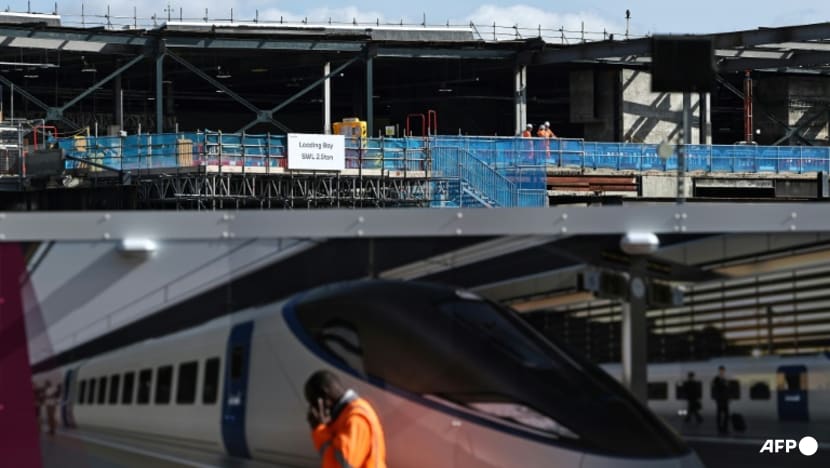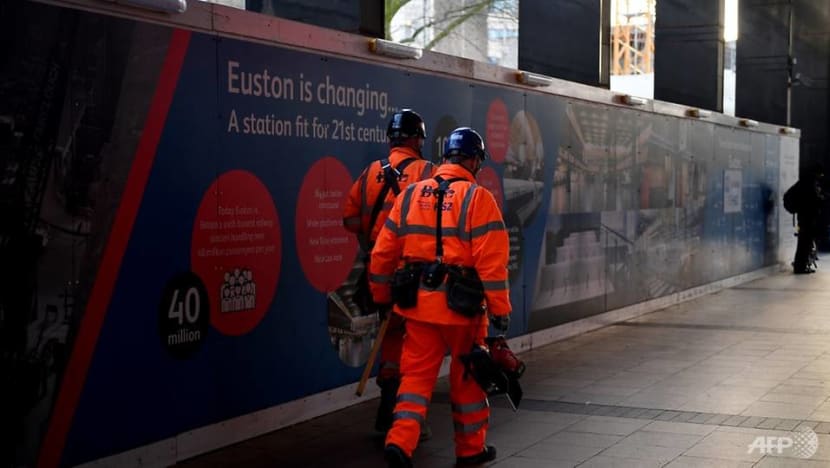Broken promises, financial losses for communities hit by partial cancellation of UK high-speed rail project
The High Speed 2 project, known as HS2, was originally planned to link London to the north of England from 2026, but the government cancelled the second part of the planned route in October last year.


This audio is generated by an AI tool.
LONDON: The town where England’s new high-speed rail project was originally meant to terminate is facing bankruptcy, after the government cancelled the second part of the planned route.
The High Speed 2 project, known as HS2, was originally planned to link London to the north of England from 2026.
However, it had its route radically shortened and will only run from London to Birmingham in central England, after Prime Minister Rishi Sunak in October last year cancelled the construction of the second phase from Birmingham up to Manchester.
He had argued that the benefits of the second part would be better achieved through smaller, alternative projects in the region instead.
HS2 and the government are now facing the question of what to do with all the plots of land that had already been purchased.
The changing of plans has also damaged investor confidence in Britain's ability to deliver long-term, large-scale infrastructure projects, according to industry insiders.
PROMISE OF BENEFITS DASHED
The new high-speed rail project was due to go through the town of Crewe, bringing what the government promised would be once-in-a-generation benefits for its residents.
“What we were expecting from HS2 was an increased capacity on our rail network locally. So the movement of goods in and around the area, north and south, was going to be improved,” Mr Paul Colman, chief executive of the South Cheshire Chamber of Commerce and Industry, told CNA.
“That would have freed up capacity for local passenger services and to free up the network. With it would have come investment, jobs (and) businesses relocating in the area.”
A total of 37,000 new jobs had been projected to be created from a new commercial hub and upgraded train station, bringing in an estimated US$200 million a year for the area.
None of that will happen now, with the high-speed line terminating 6km to the south in the country’s second-largest city of Birmingham.
“The decision that the Prime Minister had taken to cancel HS2 was obviously devastating news. Both the public and private sector had been planning for this over the last 10 (to) 12 years,” said Mr Colman.
“All plans going forward were based on the fact that HS2 was coming to Crewe, and all those plans now have been scuppered.”
Mr Sunak had cancelled the northern phase, citing massive cost overruns and delays. Construction of that part had not yet begun, unlike in the southern portion.
LACK OF SUPPORT
Much of the country, however, had long been hostile towards the project, in principle and due to the way it has been rolled out, especially outside of urban centres.
A few kilometres south in rural Madeley, Mr Sunak’s announcement that the train line would stop before the village was met with jubilation.
Councillor Gary White from the Newcastle-under-Lyme Borough Council told CNA the town would have had to endure seven years of disruption, with roads closed or diverted due to the construction works.
At its peak, there would have been 500 lorries taking rubble away from the construction sites daily.
The HS2 project had for years been purchasing hundreds of millions of dollars worth of land, drilling boreholes and even planting trees to mitigate future environmental damage.
How HS2 and the government will reverse that process remains a headache.
“Pragmatically, you would expect that actually quite quickly, the land could be handed back and the houses could be back on the market. That isn't the case. What we are told, from a legal perspective, is that the compulsory purchase order has to go through to completion,” said Mr White.
“So landowners are still having to negotiate a purchase price from HS2. They're still having to negotiate compensation.”
Among those whose land parcels were purchased by the HS2 project is farmer Bernard Kettle.
To build a tunnel below his fields, the project bought over 60 per cent of his farmland.
However, he has not received any compensation over the cancellation of the project, nor any news on how he will get his land or money back.
"They haven't given me anything. They are supposed to compensate me for damage they have done to the field (and) they are supposed to reinstate the field, but nobody’s been near ... I'm just a statistic,” Mr Kettle told CNA.
UNCERTAINTY OVER LAND PLOTS
There is also still no certainty about whether former land owners will be able to repurchase the now unnecessary plots.
Even if they are, the plots will likely be sold at the current market value, which could be much higher than what the original owners received, hence making it potentially unaffordable.
Some mansions in the area have been left empty for years, though maintenance and security is still being paid for with taxpayer dollars until they can be sold.
Further south, the construction of HS2 is ongoing between Birmingham and London, with viaducts, bridges, railway tracks and tunnels already being built.

Mr Sunak said the first phase of the project would be able to triple the level of demand that is currently on the rail network.
However, HS2’s new termination point in a revamped London Euston station, will have fewer platforms and hence less frequent services along the high speed route.
Such an abrupt shift in plans has shaken investor confidence in the country’s ability to deliver such infrastructure projects.
The country’s industrial sector also fears further delays and uncertainty over the project, which still has more than a decade until its expected full completion.
With the opposition Labour Party on track to win the next general election, there could be a disruption to policy continuity in the country.














